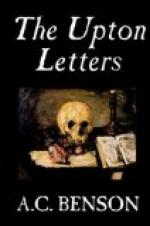But what has made the book to me into a kind of Lenten manual is the presentation of the masters. Here I see, portrayed with remorseless fidelity, the faults and foibles of my own class; and I am sorry to say that I feel deliberately, on closing the book, that schoolmastering must be a dingy trade. My better self cries out against this conclusion, and tries feebly to say that it is one of the noblest of professions; and then I think of King and Prout, and all my highest aspirations die away at the thought that I may be even as these.
I suppose that Kipling would reply that he has done full justice to the profession by giving us the figures of the Headmaster and the Chaplain. The Headmaster is obviously a figure which his creator regards with respect. He is fair-minded, human, generous; it is true that he is enveloped with a strange awe and majesty; he moves in a mysterious way, and acts in a most inconsequent and unexpected manner. But he generally has the best of a situation; and though there is little that is pastoral about him, yet he is obviously a wholesome-minded, manly sort of person, who whips the right person at the right time, and generally scores in the end. But he is a Roman father, at best. He has little compassion and no tenderness; he is acute, brisk, and sensible; but he has (at least to me) neither grace nor wisdom; or, if he has, he keeps them under a polished metallic dish-cover, and only lifts it in private. I do not feel that the Headmaster has any religion, except the religion of all sensible men. In seeming to despise all sentiment, Kipling seems to me to throw aside several beautiful flowers, tied carelessly up in the same bundle. There should be a treasure in the heart of a wise schoolmaster; not to be publicly displayed nor drearily recounted; but at the right moment, and in the right way, he ought to be able to show a boy that there are sacred and beautiful things which rule or ought to rule the heart. If the Head has such a treasure he keeps it at the bank and only visits it in the holidays.
The “Padre” is a very human figure—to me the most attractive in the book; he has some wisdom and tenderness, and his little vanities are very gently touched. But (I daresay I am a very pedantic person) I don’t really like his lounging about and smoking in the boys’ studies. I think that what he would have called tolerance is rather a deplorable indolence, a desire to be above all things acceptable. He earns his influence by giving his colleagues away, and he seems to me to think more of the honour of the boys than of the honour of the place.




